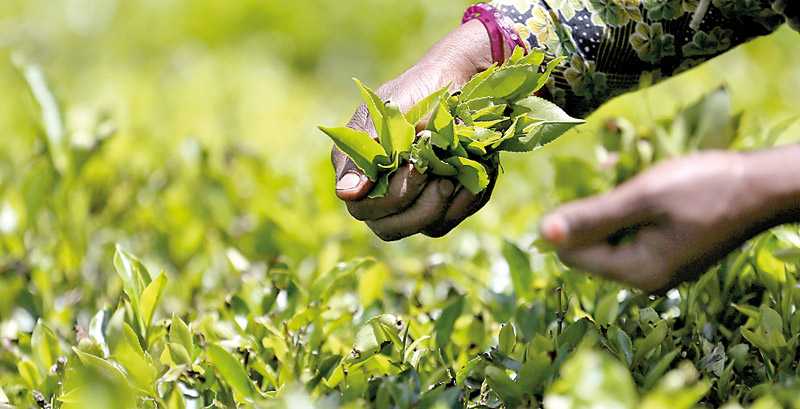Tuesday Feb 24, 2026
Tuesday Feb 24, 2026
Monday, 14 December 2020 04:56 - - {{hitsCtrl.values.hits}}

By Charumini de Silva
The Sri Lanka Tea Board (SLTB) has allocated Rs. 450 million for several fresh development initiatives hoping for a gradual shift towards enhancing the yield and quality of Ceylon Tea by encouraging additional 50 million new plants by next year.
To support these initiatives SLTB has introduced an array of new financial schemes, including grants to planters and estate owners, to encourage re-planting and new plantings as well as shading management programs.
“Sri Lanka’s tea production has dropped significantly over the past few years from 340 million kilograms per annum to 300 million kilograms at present. Thereby, the SLTB with State assistance has introduced these new funding schemes to enhance efforts to improve the production, while upgrading leaf quality of Ceylon teas,” SLTB Tea Commissioner E.A.J.K. Edirisinghe told the Daily FT.
In 2019, Ceylon Tea Traders Association (CTTA) launched the ‘Ceylon Tea Road Map 2030’, which aimed to enhance annual tea production to 350 million kilograms, whilst doubling the export earnings to $ 3 billion by 2030.
He said that the new funding schemes were introduced in addition to the existing subsidies from which the industry already benefits.
Edirisinghe said the initiative titled ‘Re-awakening Tea 2021-2025 Tea Revival Half Decade’ encourages tea smallholders to replant new and replace dead plants in this five-year program, where the Tea Small Holdings Development Authority will offer grants of Rs. 500,000 per hectare for tea replanting, Rs. 310,000 per hectare for new planting and Rs. 100,000 per dead plant to be replanted anew in the tea land.
He asserted that smallholders and their production systems played a significant role in the future of Sri Lanka’s tea industry. Smallholdings today account for over 75% of the total made tea production, which is a strong helping hand to the national economy.
In addition, a funding scheme for high shade trees for medium-scale and large-scale tea estate category of over 10 acres is being rolled out where Tea Board will provide Rs. 100 per high shade tree established in the field for a maximum of 28 plants per acre.
Despite the challenges, Sri Lanka’s tea industry, with State assistance, aims to improve the production with immature and undamaged leaves.
The Tea Commissioner also pointed out that drought was another key factor for the loss of crops and suggested the need to implement irrigation systems and seedling a variety of teas in the country.
“Unfavourable weather conditions have resulted in a decrease in tea production. During the period from January to March, most of our tea crops fall due to the severe drought. However, to mitigate such loss of crop, it is essential for the estate owners to implement simple irrigation systems to eliminate such climate-related risks and allow tea plants to receive the correct amount of water and nutrients,” he added.
Edirisinghe said that the stakeholders had been informed to implement an irrigation system for tea plantations next year to ensure stable yield and quality of tea.